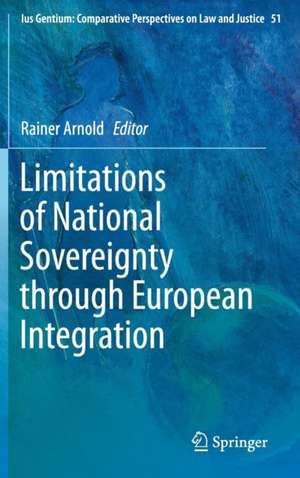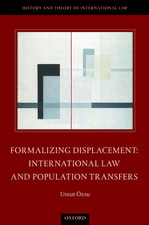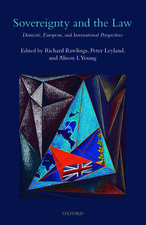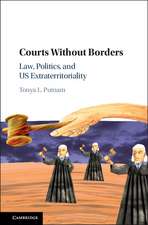Limitations of National Sovereignty through European Integration: Ius Gentium: Comparative Perspectives on Law and Justice, cartea 51
Editat de Rainer Arnolden Limba Engleză Hardback – 4 mar 2016
Studies on selected EU member states clarify the specific national approaches towards the limitations of their sovereignty as developed by the constitutional jurisprudence (Poland, Czech Republic, Hungary, Romania, Italy, Germany with comparative references to United Kingdom and France). It is illuminated that traditionally strong sovereignty concepts (UK, France) are considerably relativized and functionally opened towards the integration challenges. Basic issues are furthermore reflected, such as the supranational impact on the State’s power to reform its Constitution, the relation of national and constitutional identity and the national and supranational perspectives of identity. The book also includes Europe beyond the EU by research on the supranational character of association treaties (from a Ukrainian perspective) and on the Europeanization of a third country preparing EU membership (Albania).
| Toate formatele și edițiile | Preț | Express |
|---|---|---|
| Paperback (1) | 636.12 lei 6-8 săpt. | |
| SPRINGER NETHERLANDS – 7 apr 2018 | 636.12 lei 6-8 săpt. | |
| Hardback (1) | 642.18 lei 6-8 săpt. | |
| SPRINGER NETHERLANDS – 4 mar 2016 | 642.18 lei 6-8 săpt. |
Din seria Ius Gentium: Comparative Perspectives on Law and Justice
- 20%
 Preț: 1128.16 lei
Preț: 1128.16 lei - 20%
 Preț: 1565.18 lei
Preț: 1565.18 lei - 18%
 Preț: 1115.28 lei
Preț: 1115.28 lei - 18%
 Preț: 904.28 lei
Preț: 904.28 lei - 18%
 Preț: 1001.81 lei
Preț: 1001.81 lei -
 Preț: 180.18 lei
Preț: 180.18 lei - 24%
 Preț: 787.31 lei
Preț: 787.31 lei - 18%
 Preț: 1115.28 lei
Preț: 1115.28 lei - 15%
 Preț: 635.31 lei
Preț: 635.31 lei - 18%
 Preț: 1108.67 lei
Preț: 1108.67 lei - 18%
 Preț: 1007.97 lei
Preț: 1007.97 lei - 18%
 Preț: 784.79 lei
Preț: 784.79 lei - 18%
 Preț: 1223.11 lei
Preț: 1223.11 lei - 18%
 Preț: 891.02 lei
Preț: 891.02 lei - 18%
 Preț: 1009.40 lei
Preț: 1009.40 lei - 18%
 Preț: 1005.74 lei
Preț: 1005.74 lei - 18%
 Preț: 1014.89 lei
Preț: 1014.89 lei - 18%
 Preț: 896.70 lei
Preț: 896.70 lei - 15%
 Preț: 641.85 lei
Preț: 641.85 lei - 18%
 Preț: 779.71 lei
Preț: 779.71 lei - 18%
 Preț: 1010.79 lei
Preț: 1010.79 lei - 18%
 Preț: 1010.03 lei
Preț: 1010.03 lei - 18%
 Preț: 950.52 lei
Preț: 950.52 lei - 15%
 Preț: 638.76 lei
Preț: 638.76 lei - 18%
 Preț: 947.50 lei
Preț: 947.50 lei - 20%
 Preț: 564.78 lei
Preț: 564.78 lei - 18%
 Preț: 1115.14 lei
Preț: 1115.14 lei - 18%
 Preț: 939.42 lei
Preț: 939.42 lei - 15%
 Preț: 635.80 lei
Preț: 635.80 lei - 15%
 Preț: 637.59 lei
Preț: 637.59 lei - 15%
 Preț: 643.65 lei
Preț: 643.65 lei - 24%
 Preț: 809.18 lei
Preț: 809.18 lei
Preț: 642.18 lei
Preț vechi: 755.51 lei
-15% Nou
Puncte Express: 963
Preț estimativ în valută:
122.90€ • 127.83$ • 101.46£
122.90€ • 127.83$ • 101.46£
Carte tipărită la comandă
Livrare economică 14-28 aprilie
Preluare comenzi: 021 569.72.76
Specificații
ISBN-13: 9789401774697
ISBN-10: 9401774692
Pagini: 197
Ilustrații: IX, 197 p. 1 illus.
Dimensiuni: 155 x 235 x 13 mm
Greutate: 0.47 kg
Ediția:1st ed. 2016
Editura: SPRINGER NETHERLANDS
Colecția Springer
Seria Ius Gentium: Comparative Perspectives on Law and Justice
Locul publicării:Dordrecht, Netherlands
ISBN-10: 9401774692
Pagini: 197
Ilustrații: IX, 197 p. 1 illus.
Dimensiuni: 155 x 235 x 13 mm
Greutate: 0.47 kg
Ediția:1st ed. 2016
Editura: SPRINGER NETHERLANDS
Colecția Springer
Seria Ius Gentium: Comparative Perspectives on Law and Justice
Locul publicării:Dordrecht, Netherlands
Public țintă
ResearchCuprins
Foreword.- 1. Limitation of Sovereignty by European Integration: the German Experience in a Comparative View; Rainer Arnold.- 2. European Integration and Limitation of Power of Constitutional Reform; Francisco Balaguer Callejon.- 3. National and Constitutional Identity as al Legal and Political Instrument; Luca Mezzetti.- 4. National identity and market freedoms after the Treaty of Lisbon; Sinisa Rodin.- 5. The European Union in the Constittutional Framework of Member States: The Italian Case; Diana-Urania Galetta.- 6. Limitation of Sovereignty by the European Integration - the Polish approach; Boguslaw Banaszak.- 7. The Transfer of Sovereignty in the case-law of the Hungarian Constitutional Court; Peter Kovacs.- 8. An 'Entirely-Specific' Situation or a Routine Limitation of National Autonomy? Slovak Pension XVII of the Czech Constitutional Court; Jiri Zemanek.- 9. The Infra-Constitutionality of European Law in Romania and the Challenges of the Romanian Constitutional Culture; Manuel Gutan.- 10. Europeanization of Albanian Constitutional Law; Arta Vorpsi.- 11. The Supranational Character of the Association Agreements; Viktor Muraviov.
Textul de pe ultima copertă
The book considers the changes which national sovereignty has undergone through the supranational European integration. In various contributions by renowned academics and high judges demonstrate the serious impacts of supranationality on the EU member states and even on third countries which are connected with the EU by international treaties. It becomes clear that primacy of EU law, the most significant expression of supra-nationality, collides with national sovereignty as anchored in the national constitutions. The studies clearly show that most member states do not fully deny EU law primacy but are aware of the need to find an adequate balance between the supranational and the national orders. The result from the analyses of the authors from various European countries is that the upcoming constitutional paradigm is “constitutional identity”, a concept established by jurisprudence in Germany, France, Czech Republic (without being named so) and debated also in Poland which, herself, denies supranational impact on the national Constitution entirely.
Studies on selected EU member states clarify the specific national approaches towards the limitations of their sovereignty as developed by the constitutional jurisprudence (Poland, Czech Republic, Hungary, Romania, Italy, Germany with comparative references to United Kingdom and France). It is illuminated that traditionally strong sovereignty concepts (UK, France) are considerably relativized and functionally opened towards the integration challenges. Basic issues are furthermore reflected, such as the supranational impact on the State’s power to reform its Constitution, the relation of national and constitutional identity and the national and supranational perspectives of identity. The book also includes Europe beyond the EU by research on the supranational character of association treaties (from a Ukrainian perspective) and on the Europeanization of a third country preparing EU membership (Albania).
Studies on selected EU member states clarify the specific national approaches towards the limitations of their sovereignty as developed by the constitutional jurisprudence (Poland, Czech Republic, Hungary, Romania, Italy, Germany with comparative references to United Kingdom and France). It is illuminated that traditionally strong sovereignty concepts (UK, France) are considerably relativized and functionally opened towards the integration challenges. Basic issues are furthermore reflected, such as the supranational impact on the State’s power to reform its Constitution, the relation of national and constitutional identity and the national and supranational perspectives of identity. The book also includes Europe beyond the EU by research on the supranational character of association treaties (from a Ukrainian perspective) and on the Europeanization of a third country preparing EU membership (Albania).
Caracteristici
Focuses on the limitations of national sovereignty through supranational integration - a major research issue in European constitutional law Provides a comprehensive, comparative pan European analysis Contributions from leading European academics and practitioners















